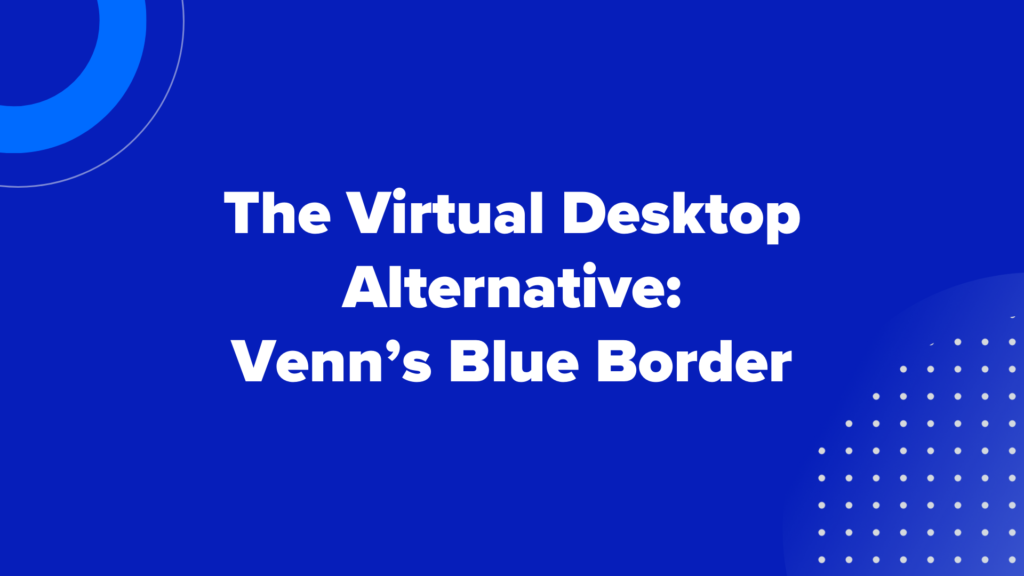Why VDI Fell Short for Leading Real Estate Firm: Venn’s Answer

Virtual Desktop Infrastructure (VDI) was once seen as a promising solution for companies. One company we recently spoke with – a leading real estate firm with a diverse set of needs and a large workforce – did just that, but for their use case, it was more of a problem than a solution. The practical implementation of VDI often falls short of expectations, leading to frustration, inefficiency, and significant overhead. Here’s a look at the challenges this company faced with VDI and why they believe Venn will be a better fit.
The VDI Struggles
- Complexity and Usability Issues: The firm’s initial implementation of VDI required users to log into a physical device and then log into a virtual desktop. This dual-login process was cumbersome and unpopular among employees. Efforts to streamline this with additional software layers only added complexity and often resulted in technical issues.
- Performance and Reliability: The VDI solution they used was plagued with performance problems. Users experienced slow and bloated systems, constant updates, and issues with FSLogix, making the virtual desktops unreliable. This unreliability led to decreased productivity and increased frustration.
- Hardware and Management Overhead: Managing a VDI setup meant dealing with the physical hardware, including provisioning, asset tagging, shipping, and eventually reclaiming devices. The logistical nightmare of handling hundreds of devices across multiple states proved to be inefficient and costly.
- Inadequate Remote Support: The existing VDI infrastructure required frequent patches and troubleshooting, leading to a high demand for technical support. Remote updates and maintenance were particularly challenging, causing delays and disruptions in daily operations.
- User Resistance: The user base at this leading real estate firm, particularly salespeople and other high-performing individuals, found the VDI environment restrictive and inconvenient. The need for high-quality, seamless technology was not met, which impacted the overall satisfaction and efficiency of the team.
Why Venn is the Solution
After seeing Venn in action, this leading real estate firm recognized several key advantages that Venn offers over traditional VDI solutions.
- Simplicity and User Experience: Venn’s solution eliminates the need for complex dual-logins and provides a seamless user experience. The Blue Border technology clearly demarcates work applications, making it intuitive for users to know when they are within a secure work environment.
- Performance and Local Execution: Unlike VDI, Venn’s approach uses locally installed applications within a secure enclave. This method ensures that users experience minimal latency and high performance, as the applications run on the local hardware rather than a remote server.
- Reduced Hardware Overhead: Venn supports a BYOD (Bring Your Own Device) model, significantly reducing the need for procuring, managing, and shipping physical hardware. This not only cuts costs but also streamlines the onboarding and offboarding processes.
- Robust Security and Compliance: Venn offers strong security features, including remote wipe capabilities and controlled data access. This ensures that sensitive information remains protected, and any potential data breaches can be swiftly managed. The solution also aligns with various compliance requirements, which is crucial for the firm’s operations.
- Flexibility and Scalability: With Venn, they can roll out the solution to new hires and gradually replace older hardware without disrupting the entire organization. This phased adoption strategy allows for smoother transitions and less resistance from users.
- Enhanced Remote Support: Venn provides an easier platform for remote support and management. IT teams can efficiently manage policies, push updates, and troubleshoot issues without the extensive overhead associated with traditional VDI setups.
Conclusion
This leading real estate firm’s experience with VDI was marked by complexity, inefficiency, and user dissatisfaction. Venn offers a compelling alternative that addresses these challenges head-on. With its user-friendly interface, robust performance, and strong security features, Venn is poised to transform their IT infrastructure, making it more efficient, cost-effective, and aligned with the company’s dynamic needs.
For organizations looking to streamline their operations and enhance their technological framework, Venn provides a solution that not only meets but exceeds expectations, paving the way for a more productive and satisfied workforce.

Scott Lavery
SVP Marketing
More Blogs


